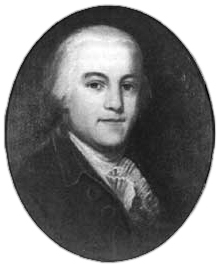Edward Rutledge
Edward Rutledge (born November 23, 1749 in Charleston , Province of South Carolina , † January 23, 1800 ibid) was a British-American politician and, as one of the signatories of the United States' Declaration of Independence, one of the American founding fathers .
Early years and political advancement
Edward Rutledge was the younger brother of John Rutledge , the first governor of South Carolina. After elementary school, Edward studied law at Middle Temple School in England and was admitted to the bar under British law in 1772. On his return in 1773 he was also admitted to the bar in South Carolina. His political ascent began in 1774 when he was a delegate to the First Continental Congress of the thirteen founding states of the later United States. In 1776 he was one of the signatories of the American Declaration of Independence. Rutledge was also a member of South Carolina’s first two regional assemblies, held in 1775 and 1776. In 1779 he was re-elected to the Continental Congress. He did not take up this post because he was an officer in the American Revolutionary War . In 1780 he was taken prisoner by the British near Charleston. He was only released in July of the following year as part of a prisoner exchange. Between 1782 and 1792 he was a member of Parliament in South Carolina with a few interruptions. In 1790 he was a member of the South Carolina Constitutional Revision Committee. He was also the initiator of the birthright law in South Carolina. In 1794, he rejected an appeal by President George Washington to the US Supreme Court. His brother John was appointed Chief Justice of that court a year later, but was not confirmed by the US Senate.
Governor of south carolina
In late 1798, Rutledge was elected governor of South Carolina by the members of parliament. His tenure began on December 18, 1798. During this time, the question was discussed whether a US state had the right to unilaterally override federal laws for its territory. Rutledge drafted a few resolutions advocating such a possibility. But he couldn't find a majority for this in South Carolina at the time. Thirty years later, during the so-called nullification crisis , this issue would still play an important role in the history of the country and the Union. The administration of South Carolina was also reformed during his tenure. New administrative units such as the districts and counties (districts) emerged. The Comptroller was also established as an independent office in South Carolina at that time. Edward Rutledge could not finish his two-year term because he died in office in January 1800. Edward Rutledge was married twice and had three children in total.
Rutledge caused some excitement because the original draft Declaration of Independence, outlined and supported by Thomas Jefferson , contained the prohibition of slavery and caused the southern states not to vote in favor until a promise was made to remove that passage. When Rutledge returned to South Carolina, he released all of his slaves.
literature
- James Haw: John and Edward Rutledge of South Carolina. University of Georgia Press, Athens 1997, ISBN 978-0-8203-1859-2 .
- Robert Sobel, John Raimo (Eds.): Biographical Directory of the Governors of the United States, 1789–1978. Vol. 4. Meckler Books, Westport, CT 1978, 4 volumes.
Web links
- Biography by Rev. Charles A. Goodrich, 1856 (English)
- Edward Rutledge in the National Governor Association (English)
- South Carolina Information Highway (English)
- Edward Rutledge in the Biographical Directory of the United States Congress (English)
- Edward Rutledge in the database of Find a Grave (English)
| personal data | |
|---|---|
| SURNAME | Rutledge, Edward |
| BRIEF DESCRIPTION | British-American politician and signatory of the United States Declaration of Independence |
| DATE OF BIRTH | November 23, 1749 |
| PLACE OF BIRTH | Charleston , South Carolina, UK |
| DATE OF DEATH | January 23, 1800 |
| Place of death | Charleston , South Carolina, United States |


